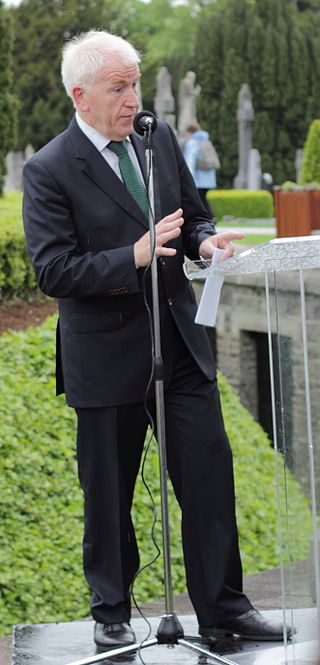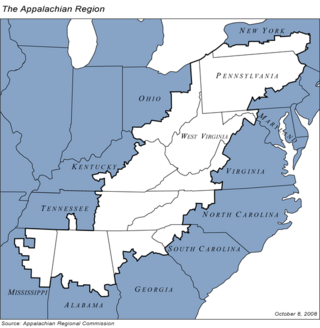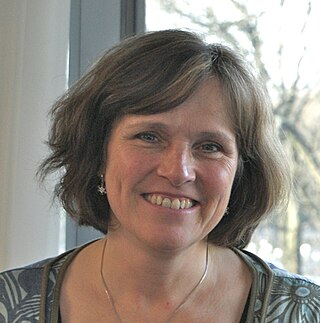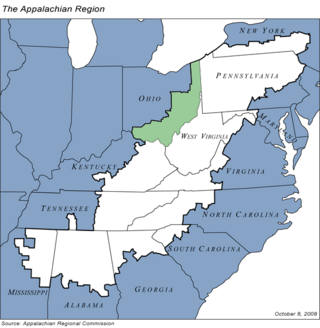
The cuisine of the Southern United States encompasses diverse food traditions of several regions, including Tidewater, Appalachian, Lowcountry, Cajun, Creole, and Floribbean cuisine. In recent history, elements of Southern cuisine have spread to other parts the United States, influencing other types of American cuisine.

The Highlands is a historical region of Scotland. Culturally, the Highlands and the Lowlands diverged from the Late Middle Ages into the modern period, when Lowland Scots replaced Scottish Gaelic throughout most of the Lowlands. The term is also used for the area north and west of the Highland Boundary Fault, although the exact boundaries are not clearly defined, particularly to the east. The Great Glen divides the Grampian Mountains to the southeast from the Northwest Highlands. The Scottish Gaelic name of A' Ghàidhealtachd literally means "the place of the Gaels" and traditionally, from a Gaelic-speaking point of view, includes both the Western Isles and the Highlands.

Appalachia is a cultural region in the Eastern United States that stretches from the Southern Tier of New York State to northern Alabama and Georgia. While the Appalachian Mountains stretch from Belle Isle in Newfoundland and Labrador, Canada, to Cheaha Mountain in Alabama, Appalachia typically refers only to the cultural region of the central and southern portions of the range, from the Catskill Mountains of New York southwest to the Blue Ridge Mountains which run southwest from southern Pennsylvania to northern Georgia, and the Great Smoky Mountains of Tennessee and North Carolina. In 2020, the region was home to an estimated 26.1 million people, of whom roughly 80% are white.
The Highlander Research and Education Center, formerly known as the Highlander Folk School, is a social justice leadership training school and cultural center in New Market, Tennessee. Founded in 1932 by activist Myles Horton, educator Don West, and Methodist minister James A. Dombrowski, it was originally located in the community of Summerfield in Grundy County, Tennessee, between Monteagle and Tracy City. It was featured in the 1985 documentary film, You Got to Move. Much of the history was documented in the book Or We'll All Hang Separately: The Highlander Idea by Thomas Bledsoe.

Jimmy Deenihan is an Irish former Fine Gael politician who served as Minister of State for the Diaspora from 2014 to 2016, Minister for Arts, Heritage and the Gaeltacht from 2011 to 2014 and Minister of State at the Department of Agriculture, Food and Forestry from 1994 to 1997. He served as a Teachta Dála (TD) from 1987 to 2016. He was a Senator from 1983 to 1987, after being nominated by the Taoiseach.

John Carl West Sr. was an American Democratic Party politician who served as the 109th governor of South Carolina from 1971 to 1975. From 1977 to 1981, he was the United States ambassador to Saudi Arabia.

The Appalachian Regional Commission (ARC) is a United States federal–state partnership that works with the people of Appalachia to create opportunities for self-sustaining economic development and improved quality of life. Congress established ARC to bring the region into socioeconomic parity with the rest of the nation.

Fiona Karen Ritchie MBE is a Scottish radio broadcaster best known as the producer and host of The Thistle & Shamrock, an hour-long Celtic music program that airs weekly throughout the United States on National Public Radio (NPR). She also curates ThistleRadio, a 24/7 web-based music channel devoted to new and classic music from Celtic roots, and is co-author of The New York Times Best Seller Wayfaring Strangers.

Appalachian music is the music of the region of Appalachia in the Eastern United States. Traditional Appalachian music is derived from various influences, including the ballads, hymns and fiddle music of the British Isles, the African music and blues of early African Americans, and to a lesser extent the music of Continental Europe.

The Upland South and Upper South are two overlapping cultural and geographic subregions in the inland part of the Southern and lower Midwestern United States. They differ from the Deep South and Atlantic coastal plain by terrain, history, economics, demographics, and settlement patterns.

Appalachian Ohio is a bioregion and political unit in the southeastern part of the U.S. state of Ohio, characterized by the western foothills of the Appalachian Mountains and the Appalachian Plateau. The Appalachian Regional Commission defines the region as consisting of thirty-two counties. This region roughly overlaps with the Appalachian mixed-mesophytic forests, which begin in southeast Ohio and southwest Pennsylvania and continue south to Georgia and Alabama. The mixed-mesophytic forest is found only in Central and Southern Appalachia and eastern/central China. It is one of the most biodiverse temperate forests in the world.
Billy Edward "Edd" Wheeler is an American songwriter, performer, writer, and visual artist.

Appalachian studies is the area studies field concerned with the Appalachian region of the United States.

Robert Urquhart was a Scottish character actor who worked on the stage, for British television, and in film. His breakthrough role was Paul Krempe in The Curse of Frankenstein in 1957, along with Peter Cushing and Christopher Lee.

Fanagmore is a hamlet in Sutherland, Highland, in far northwestern Scotland. It lies on the south shore of Loch Laxford, an inlet of the Atlantic Ocean. Fanagmore consists of three properties, a few farm buildings, a boat launch and a small harbour. There are tourist cruises from the nearby hamlet of Tarbet to Handa Island.
John B. Stephenson was a sociologist and scholar of Appalachia, a founder of the Appalachian Studies Conference, and president of Berea College from 1984 to 1994.

Foindle is a village on the south shore of Loch Laxford in Lairg, Sutherland, Scottish Highlands and is in the Scottish council area of Highland.
Jim Wayne Miller was an American poet and educator who had a major influence on literature in the Appalachian region.
Sir Thomas Martin Devine is a Scottish academic and author, who specializes in the history of Scotland. He is known for his overviews of modern Scottish history. He is an advocate of the total history approach to the history of Scotland. Before his retirement, he was a professor at the University of Strathclyde, the University of Aberdeen and the University of Edinburgh.













